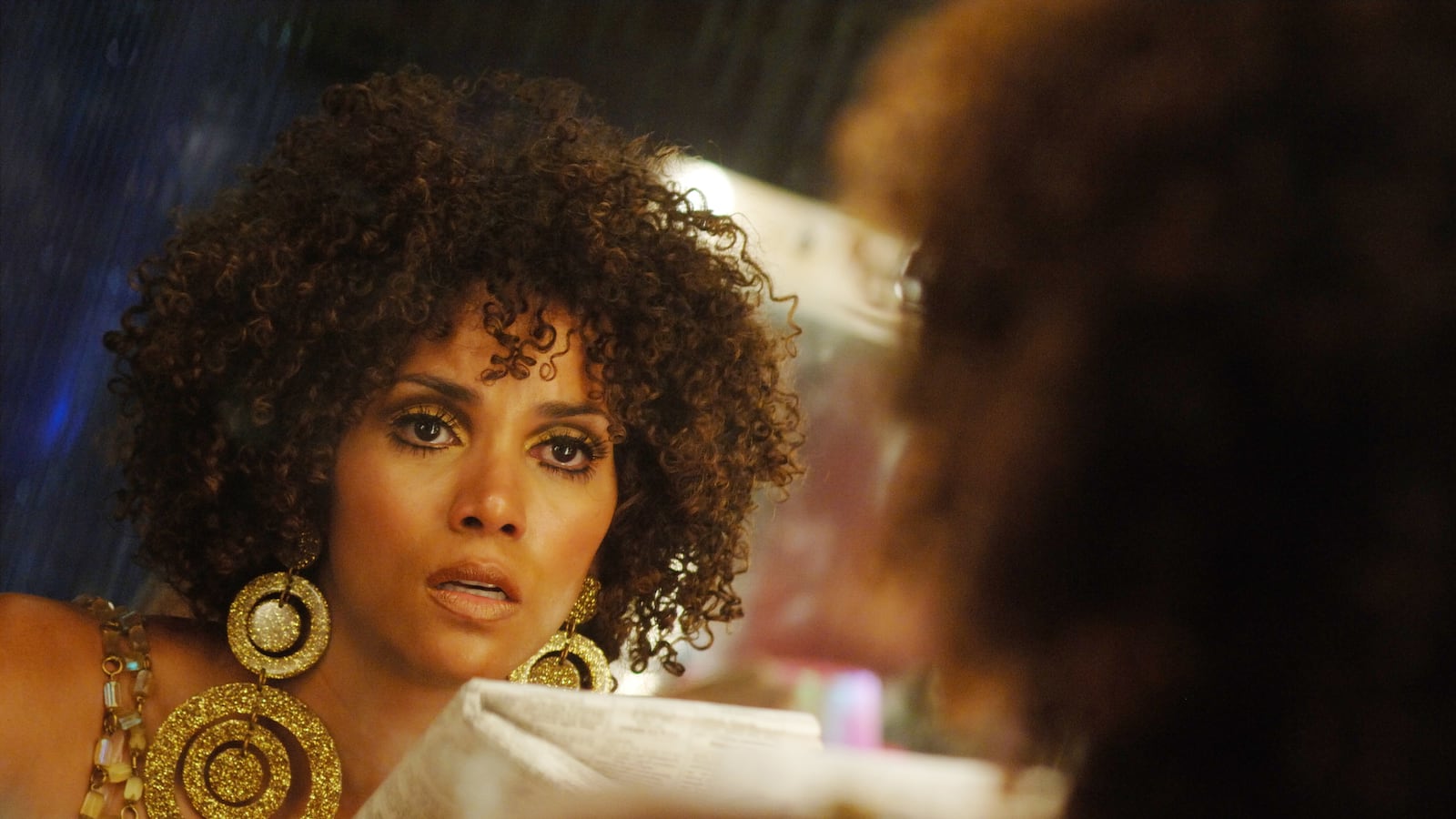Halle Berry was nominated for a Golden Globe in 2011 for the movie Frankie & Alice. You probably don’t remember the film itself, though, since you wouldn't have been able to see it. Frankie & Alice, shot way back in the winter of 2008, was never released in theaters—it only enjoyed a “qualifying run” for awards consideration on one screen in Los Angeles for one week. Why is this worth mentioning now? Well, because in a rare move, the film is being released this week by Codeblack Entertainment, a small offshoot of Lionsgate. And so far, it isn’t that clear what the hell took so long.

The film, starring Oscar winner and X-Woman Berry and directed by Geoffrey Sax, tells the true tale of a 1970s Los Angeles go-go dancer named Frankie who suffers from dissociative identity disorder. And because truth is always more f*@!ed up than fiction, one of the personalities rolling around in her head is a white supremacist from Texas named Alice. (Now that’s what it means to battle demons.) After screening in Cannes in 2010, the film received some positive reviews, with The Hollywood Reporter even joking of its potential marketability with male viewers (Berry as stripper!) and female viewers (Berry as victim of mental disorder!) alike. Peter Travers of Rolling Stone also shared his approval, referring to Berry as “a mesmerizer who makes every moment count.”
And that’s just it: Frankie & Alice, it would seem, had all the ingredients of a solid hit, or at least a buzzworthy critical darling: an Oscar-winning star, an emotional story featuring an often misunderstood but highly sensationalized mental condition, and the much-loved “based on a true story” angle. Why, then, did we not see Frankie & Alice in theaters, say, when Berry got nominated for the Golden Globe? Why was funding mysteriously pulled from this project at the very last minute before actual release back in February 2011, as a source close to the production maintains? Publicity for the film only resurfaced in February of this year, just when Globe and Oscar-driven campaigns for current films were reaching fever pitch. Strange? You bet.
Some have speculated that the answer lies in Hollywood’s lingering hesitation to bankroll stories featuring minority lead characters. After the vague announcement stating that the release of Frankie & Alice was being delayed, the film entered a strange state of limbo that rarely occurs for a finished product: at the very least, a film will go straight to video if it can’t pick up a theatrical distribution deal, a fate usually reserved for films of lesser quality that fail to impress those with the cash to fund them. But Berry’s film, rumored to be a pet project of hers since as early as the mid ‘90s, is allegedly a good film, and it indeed had some sort of distribution deal which fell through the week it was to hit theaters.
It took Codeblack Entertainment, the production and distribution house responsible for releases like Kevin Hart: Let Me Explain and the upcoming Forest Whitaker and Anthony Mackie thriller Repentance, to bring Frankie & Alice back from oblivion. It should be noted that Codeblack, who declined to comment about the Frankie & Alice conundrum, is also the first independent African-American-owned film studio, as well as a subsidiary of Lionsgate Entertainment—which is home to The Tyler Perry Company. So the helping hand of this “niche market” film company graciously stepped in and saved Berry’s latest drama—it’s just surprising it needed saving in the first place.
Berry, who acted as a producer for the first time on this film, had suffered from a few box office disappointments prior to the production of Frankie & Alice. Nobody likes to talk about Catwoman, and the drama Things We Lost in the Fire, which starred the actress opposite Benicio del Toro, lost money at the box office as well. Yet we’ve seen time and again how certain personalities in the film business (ahem, M. Night Shyamalan) keep coming back, in spite of dud after disappointing dud.
It’s also important not to underestimate the box office potential of a film with any awards buzz. With the Best Supporting Actress Oscar category dominated by black actresses in recent years (Mo’Nique, Octavia Spencer, and now Lupita Nyong’o), we are happily far from the time when it was newsworthy that Whoopi Goldberg won her Best Supporting Oscar for Ghost, the first win for a black actress since 1939’s Hattie McDaniel (and Berry’s win, for that matter, which marked the first win for an African-American Lead Actress ever).
This makes the hesitation to release Frankie & Alice all the more baffling. Take Monster’s Ball itself, the drama for which Berry won her Oscar. There, she starred opposite Billy Bob Thornton, who may have had a little more clout at the time than does Stellan Skarsgard, who shares top billing with Berry in Frankie & Alice. But there is no doubt that she is the main star in both films. So why did Monster’s Ball see the light of day while Frankie & Alice had such a difficult time following suit?
The answer could simply be a numbers game. One film financier contacted for this story, who “fought really hard to bring Frankie & Alice to market” this week, speculates that whatever plan was in place back in 2011 may have simply fallen through. In the end, there may not have been enough money to sufficiently advertise for the film in support of its release. But the question remains, why would the money have been pulled? Especially with a Globe nomination to the film’s credit? The exec, who chose to remain nameless, goes on to say that it isn’t unreasonable to think that the race card may have come into play here.
What if Charlize Theron was brought in to do a remake of the Sally Field schizophrenic classic Sybil? Would that film, also starring an early 2000s Best Actress Oscar winner, have been in limbo this long?
What were the red flags for Frankie & Alice? Was it the portrayal of mental illness which many have termed a touchy subject, or was it the perceived racial implications of a top black actress battling with a white supremacist inside her head? We may never know.






